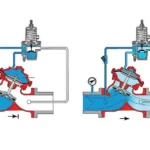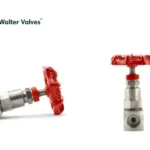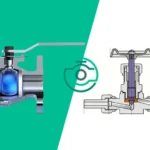In the oil and gas, chemical, and power generation industries, instrumentation valves are critical components in fluid and gas measurement systems, ensuring precise control, isolation, and regulation of media in high-accuracy environments. Unlike process valves designed for high flow control, instrumentation valves are built to handle smaller flow rates with precision.

Instrumentation valves are compact, high-precision valves used in systems where accurate regulation and measurement of flow are essential. They are used to control, isolate, or monitor the flow within pipelines connected to pressure gauges, transmitters, and other instruments. Designed to withstand vibration and maintain seal integrity under fluctuating pressures, these valves offer reliable control for low to medium flow rates.
Types of Instrumentation Valves
Instrumentation valves come in various forms to meet specific operational requirements. The most common types include:

Needle Valve
Needle valves feature a slender, pointed needle-like stem that allows for precise control of fluid flow. They are ideal for fine regulation and throttling.
• Applications: Sampling systems, precise flow measurement, pressure gauges.
• Advantages: Accurate control, minimal leakage, high reliability.
Ball Valve
Ball valves use a spherical valve body with a central hole. Rotating the valve 90 degrees quickly opens or closes the flow path.
• Applications: Shut-off services, instrument lines, rapid isolation.
• Advantages: Fast operation, low pressure drop, excellent sealing.
Globe Valve
Globe valves regulate fluid flow using a disc that moves perpendicular to the seat, suitable for throttling and frequent operation.
• Applications: Flow control, throttling systems, steam applications.
• Advantages: Accurate throttling, long lifespan, high pressure resistance.
Check Valve
Check valves allow fluid to flow in only one direction, automatically preventing backflow.
• Applications: Protecting sensitive equipment, instrumentation circuits, pump protection.
• Advantages: Automated operation, no manual intervention needed, enhanced safety.
Common Applications of Instrumentation Valves

Instrumentation valves are key components in high-demand industrial processes, particularly those requiring precise control and safety assurance. Typical applications include:
• Oil and gas pipelines
• Petrochemical refineries
• Pharmaceutical processing plants
• Power plants (thermal, hydro, nuclear)
• Chemical manufacturing and distribution
• Fluid sampling and analysis systems
• HVAC and refrigeration systems
Essential Features of Instrumentation Valves
When selecting instrumentation valves, several critical features must be evaluated to ensure optimal performance:
| Feature | Importance |
| Pressure rating | Must handle system-specific operating pressure. |
| Temperature rating | Suitable for operating temperatures from low to high. |
| Material compatibility | Ensures compatibility with process fluids to prevent corrosion and contamination. |
| Leakage rate | Valves should have minimal leakage to ensure safety and efficiency. |
| Ease of maintenance | Simple installation, operation, and maintenance significantly reduce downtime. |
How Instrumentation Valves Improve Safety and Efficiency
Choosing the right valve minimizes downtime caused by system failures or routine maintenance. Specifically:
• Greater safety: Instrumentation valves prevent hazardous leaks and backflow, ensuring personnel safety and environmental compliance. Their reliable sealing reduces the risk of equipment damage and workplace injuries.
• Improved process efficiency: Needle and globe valves offer precise flow control, enabling accurate fluid dynamics management. This results in consistent product quality, reduced material waste, and lower operational costs.
• Lower maintenance costs: Durable valves require less frequent servicing or replacement. Using valves from reputable manufacturers like Walter Valve improves equipment reliability and minimizes unplanned downtime, helping industries reduce lifecycle costs.
Selection Criteria for Instrumentation Valves
Choosing the appropriate instrumentation valve involves careful consideration of several factors:
• Fluid type: Compatibility with gases, liquids, corrosive substances, or abrasive media.
• Pressure and temperature: Valve ratings must meet or exceed application requirements.
• Valve operation: Frequency and type of operation (switching, throttling, or isolation).
• Material selection: Stainless steel, brass, or alloys suited to fluid properties.
• Valve size and end connections: Must match pipeline requirements.
• Certifications and standards compliance: Ensure conformity with industry standards such as ISO, ANSI, API, and relevant safety codes.
Instrumentation Valve Standards and Certifications

Valves typically comply with:
• ANSI, ASME, and ISO design and material standards
• Testing: Hydrostatic, pneumatic, seat leakage (gas tightness)
Some high-purity valves are assembled in cleanrooms for semiconductor or pharmaceutical applications.
Factors to Consider When Choosing Instrumentation Valves
Key selection criteria include:
• Pressure and temperature ratings
• Valve type (needle, ball, etc.)
• Media compatibility
• End connections: NPT, BSPT, compression fittings
• Cv (flow coefficient) for accurate sizing
Installation and Maintenance Best Practices
Use PTFE tape or metal gaskets depending on media and pressure. Avoid over-tightening. Always check torque specifications, especially in high-vibration environments. Regular inspection and seat replacement can extend valve life and prevent leaks.
Instrumentation Valves vs. Process Valves
Instrumentation valves are smaller, lighter, and more precise. Process valves handle larger volumes and are designed for isolation rather than measurement. Instrumentation valves are optimized for repeatability and leak integrity.
Market Trends and Innovations in Valve Design
Emerging trends include:
• Smart valves with integrated sensors
• Ultra-compact modular manifolds
• Packing systems that meet fugitive emission standards
• Metal-to-metal sealing valves for extreme environments
Quality Assurance and Reliability in Valve Manufacturing
Precision machining, 100% pressure testing, and material traceability (MTR) are essential. Reliable manufacturers follow strict ISO procedures and maintain quality audit and compliance documentation.
Why Walter Valve Stands Out in the Instrumentation Valve Market

Walter Valve brings decades of experience in China’s national instrumentation valve industry, offering:
• Complete instrumentation valve solutions
• Competitive B2B pricing, large inventory, and fast turnaround
• Proven reliability in energy, petrochemical, and OEM markets
• Quality backed by industry association membership and technical heritage
Example: Walter Valve Instrumentation Ball Valve Specifications
| Specification | Details |
| Valve type | Bi-directional ball valve |
| Material | Stainless steel (304, 316) |
| Pressure rating | Up to 6000 psi |
| Temperature range | -40°C to 250°C |
| Connection types | Threaded, flanged, compression |
| (Note: Specifications are for reference only; specific details may vary based on customer requirements.) |
Conclusion
Instrumentation valves are indispensable components in modern industrial precision fluid control systems. Choosing the right valve type, material, and manufacturer ensures long-term valve performance, safety, and operational efficiency. For B2B buyers, partnering with a reliable and technically proficient supplier like Walter Valve offers significant advantages in quality, cost, and support.




